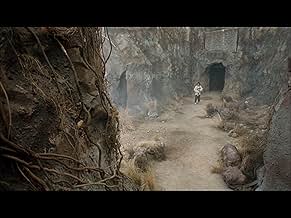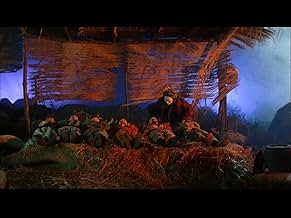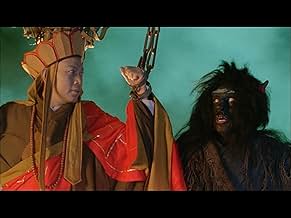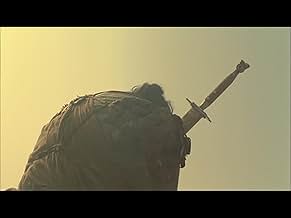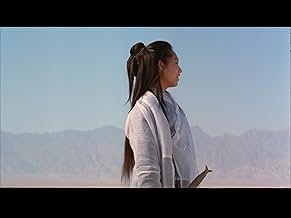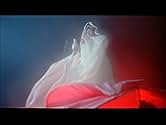A Chinese Odyssey Part Two: Cinderella
Originaltitel: Sai yau gei: Sin leui kei yun
- 1995
- 1 Std. 38 Min.
IMDb-BEWERTUNG
7,8/10
8860
IHRE BEWERTUNG
Füge eine Handlung in deiner Sprache hinzuThe convoluted continuation of the adventures of the time-traveling, now-human Monkey King, who attempts to fulfill his divine destiny.The convoluted continuation of the adventures of the time-traveling, now-human Monkey King, who attempts to fulfill his divine destiny.The convoluted continuation of the adventures of the time-traveling, now-human Monkey King, who attempts to fulfill his divine destiny.
- Auszeichnungen
- 4 Gewinne & 3 Nominierungen insgesamt
Handlung
WUSSTEST DU SCHON:
- WissenswertesAthena Chu (Zixia) and Stephen Chow (Joker) had actually been in a relationship since first meeting on To hok wai lung 2 (1992). However, it soon ended after 3 years, and this film was their last together.
- VerbindungenFollowed by Da hua xi you 3 (2016)
Ausgewählte Rezension
What an insane thing this is! The story of cinema has been written from a predominantly Western point of view this first hundred years. Were it to be evenly told somehow, this would be in a short list of cult classics you have to see, for sheer bonkers imagination.
It's rooted in a Chinese classic about the Buddhist monk who brought back the first scriptures from India but that's just the springboard that supplies the context and characters of legend, it has as much actual history as the Pythons' Holy Grail does about medieval times.
Everything at first takes place in some remote outpost where a mysterious woman walks into the company of a petty thief and his gang. That night characters are revealed to be Devils, the woman changes into a giant spider. Immortals and supernatural beings show up through both films. The "hero" is a scoundrel who gets beaten all the time and set on fire, in that marvelous way Hong Kong has of mocking cool.
There's time travel and a story about being incarnated as the "Monkey King" of legend, meanwhile the famed Buddhist monk is shown to nag everyone with legalistic obtuseness. Illusory magic puts characters in each other's bodies. Half of it makes no sense at all but strangely it somehow does. A Bull King with his army comes stomping into the scene. Now and then it erupts in flying wuxia, remarkable gliding and leaping through colored smoke. A battle takes place inside someone's body, slashing through arteries!
It's all as crazy as anything the Pythons and Abrahams/Zucker did, as devilish as Army of Darkness. It's drawing from its own Chinese folk tradition of course about ghosts, immortals and magical belief. It begins with Guanyin, this is the boddhisatva of compassion in Buddhism, facing off with Monkey because Monkey can't stand the monk's nagging and wants out from the mission.
How revealing to watch it with a Marvel comparison in mind (who have many of the same stuff, mythic beings, gods and demigods) where everything has to be laboriously explained. Everything here just springs from air, shapeshifts in and out of illusion. Characters come and go with no obligation to some overarching purpose, or feels like it. Self is malleable, a matter of illusory disguise, a foolish invention the story gives rise to; so proper in a Buddhist context.
Another context sees the women in control, the men as dufuses. Men and women change bodies, changing the social dynamics. Self being illusory, anyone can be anything, a devil of vast powers turn into just a girl in love. Yet the central tenet in the story is the pining for deep love.
I could barely make sense of it but what I could hold onto is sweet and layered. The hero travels through time to save his loved one, until he loses himself. But it seems that was someone he started to love out of duty to a story he made up, because he said he was who she was waiting for, Monkey. Being lost, he meets another girl who is his true love and "turns him" into that person. There's body swapping at this point and she becomes possibly a Pigheaded henchman. His being torn between dutiful and true love is surreally transmuted in a scene with dual marriages supposed to take place.
By the end we have veered off into a cosmic showdown where the sun is tethered close and burns everything up. And then we return to normative reality. The "Monkey King" has to resume his place dutifully in the journey of fantastic mythadventure while his mortal self stays behind with the love of his life. Parting illusory from real.
This is taking whimsical nonsense as your dharma teacher.
It's rooted in a Chinese classic about the Buddhist monk who brought back the first scriptures from India but that's just the springboard that supplies the context and characters of legend, it has as much actual history as the Pythons' Holy Grail does about medieval times.
Everything at first takes place in some remote outpost where a mysterious woman walks into the company of a petty thief and his gang. That night characters are revealed to be Devils, the woman changes into a giant spider. Immortals and supernatural beings show up through both films. The "hero" is a scoundrel who gets beaten all the time and set on fire, in that marvelous way Hong Kong has of mocking cool.
There's time travel and a story about being incarnated as the "Monkey King" of legend, meanwhile the famed Buddhist monk is shown to nag everyone with legalistic obtuseness. Illusory magic puts characters in each other's bodies. Half of it makes no sense at all but strangely it somehow does. A Bull King with his army comes stomping into the scene. Now and then it erupts in flying wuxia, remarkable gliding and leaping through colored smoke. A battle takes place inside someone's body, slashing through arteries!
It's all as crazy as anything the Pythons and Abrahams/Zucker did, as devilish as Army of Darkness. It's drawing from its own Chinese folk tradition of course about ghosts, immortals and magical belief. It begins with Guanyin, this is the boddhisatva of compassion in Buddhism, facing off with Monkey because Monkey can't stand the monk's nagging and wants out from the mission.
How revealing to watch it with a Marvel comparison in mind (who have many of the same stuff, mythic beings, gods and demigods) where everything has to be laboriously explained. Everything here just springs from air, shapeshifts in and out of illusion. Characters come and go with no obligation to some overarching purpose, or feels like it. Self is malleable, a matter of illusory disguise, a foolish invention the story gives rise to; so proper in a Buddhist context.
Another context sees the women in control, the men as dufuses. Men and women change bodies, changing the social dynamics. Self being illusory, anyone can be anything, a devil of vast powers turn into just a girl in love. Yet the central tenet in the story is the pining for deep love.
I could barely make sense of it but what I could hold onto is sweet and layered. The hero travels through time to save his loved one, until he loses himself. But it seems that was someone he started to love out of duty to a story he made up, because he said he was who she was waiting for, Monkey. Being lost, he meets another girl who is his true love and "turns him" into that person. There's body swapping at this point and she becomes possibly a Pigheaded henchman. His being torn between dutiful and true love is surreally transmuted in a scene with dual marriages supposed to take place.
By the end we have veered off into a cosmic showdown where the sun is tethered close and burns everything up. And then we return to normative reality. The "Monkey King" has to resume his place dutifully in the journey of fantastic mythadventure while his mortal self stays behind with the love of his life. Parting illusory from real.
This is taking whimsical nonsense as your dharma teacher.
- chaos-rampant
- 20. Okt. 2015
- Permalink
Top-Auswahl
Melde dich zum Bewerten an und greife auf die Watchlist für personalisierte Empfehlungen zu.
- How long is A Chinese Odyssey: Part 2 - Cinderella?Powered by Alexa
Details
- Erscheinungsdatum
- Herkunftsländer
- Sprache
- Auch bekannt als
- A Chinese Odyssey: Part 2 - Cinderella
- Produktionsfirmen
- Weitere beteiligte Unternehmen bei IMDbPro anzeigen
Box Office
- Weltweiter Bruttoertrag
- 25.967.935 $
Zu dieser Seite beitragen
Bearbeitung vorschlagen oder fehlenden Inhalt hinzufügen

Oberste Lücke
By what name was A Chinese Odyssey Part Two: Cinderella (1995) officially released in Canada in English?
Antwort

